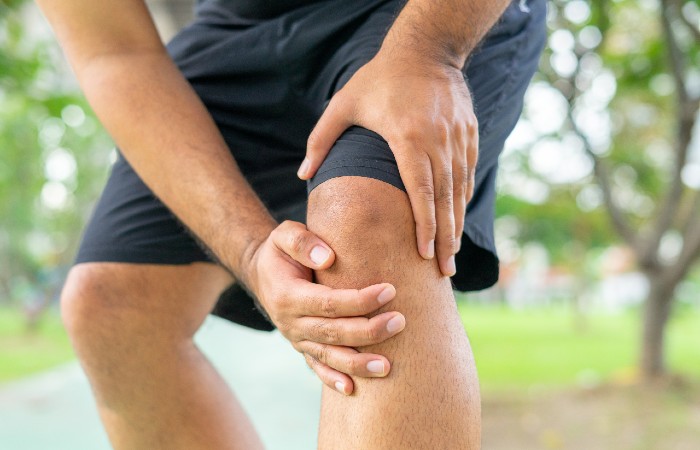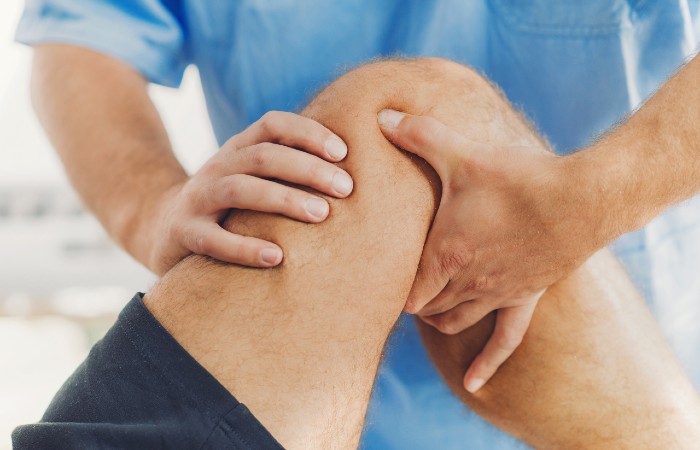

 By - Ritika Dogra Functional Manual Therapist at VARDĀN |
| ACL stands for anterior cruciate ligament. The ACL is a tissue that connects the thighbone to the shinbone, at the knee. The anterior cruciate ligament is one of the four ligaments in the knee that provides stabilization to the knee joint. |
|
An ACL injury develops when the ACL, a ligament that links the
thighbone and shinbone, stretches beyond its capacity and tears. This type of injury frequently occurs during active sports that involve a lot of jumping, and rapid starts and stops. More than 70% of ACL injuries occur without any contact or blow to the knee. |
An ACL tear is usually sudden and is regularly seen in both
contact and non-contact sports. ACL injuries most commonly occur during the following
activities:
|
Along with significant pain, a key sign of an ACL injury is a
“popping” sound, which occurs at the moment that the ACL is
torn or stressed.
The symptoms of an ACL injury can include:
|
While anyone can injure their ACL, certain factors can put an
individual at higher risk:
|
|
|

| An injury to the ACL affects the very stability of knee, resulting in a loss of leg strength, and a restriction in the knee's range of motion and various functional activities. Severe tears or high grade injuries will often require surgery and extensive rehabilitation to fully restore mobility. Our primary goal is injury prevention. We recognize important factors in non-athletes and athletes that may put them at risk to an injury; these may include strength or coordination deficits and body alignment. We at VARDĀN, design a program that takes into consideration an individual's normal level of activity, physical fitness, and the extent of anterior cruciate ligament (ACL) injury. The program includes proprioception and high-level balance retraining, plus sport-specific agility and functional enhancement. We also play an important role in helping patients return to their respective sports. It is important to incorporate prevention training once it has been established that a patient is able to return to their sport training. Our job is to not only fix ACL but to get patients back in their game as quickly and safely as possible. |

| Our Client Speak
“I have been suffering from Ankylosing Spondylosis (AS), severely affecting mobility of the spine and leading to back pain and associated problems.
It started affecting the neck as well in the past couple of years, restricting its movement.
In addition, my muscles are very stiff which also leads to pain in the chest and ribs.
I have consulted many doctors who have advised physiotherapy and regular exercises.
AS is not an easy condition to tackle. Indeed, association with VARDĀN came as a boon.
I also find my therapist Ritika Dogra really gifted. The way she works on my various issues and the range of exercises in her
repertoire have kept my mobility, enabling me to carry on with my day-to-day tasks.
The FMTTM sessions with Ritika give me a lot of confidence and mental strength too.
I am grateful to her and VARDĀN for helping me deal with all this which, otherwise, could have had a debilitating effect. “
|


|
VARDĀN is open for consultation & treatment sessions. You can book an appointment with our Functional Manual Therapist to avail our services. We are following stringent precautionary measures for your safety. To contact, you may call or mail us. |
Please call 011-43580720-22, 8:30 AM to 6:00 PM
Monday to Sunday
You may also contact our team on
+91-9971112446, +91-9910955500, +91-9810306730, +91-9910855500
Email: vardan@timesgroup.com | Web: www.vardan.in
Address: 16-A, Ring Road, Lajpat Nagar- IV, New Delhi 110024
